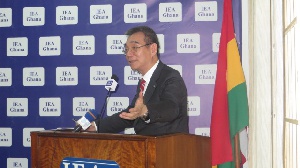Ghana can grow dynamically as China and any successful East Asian economy if government could create conditions for the private sector to thrive, Professor Yifu Lin, a renowned Chinese Structural Economist, has said.
He said the Government must proactively create conditions to capture the pending relocation of light manufacturing from China and other emerging market economies and facilitates private firms to develop those industries for the global market.
Prof Yifu made these remarks in a presentation during a public lecture organised by the Institute of Economic Affairs (IEA) on the theme: “How to Achieve a Dynamic, Inclusive and Industrialised Economy in Ghana: A New Structural Economics Approach”.
The lecture was part of the IEA’s efforts to promote good governance and a sustainable economic development in Ghana.
It was attended by high profile personalities such as former President John Agyekum Kufuor; Mr Justice Emile Short, former Chairman of the Commission on Human Rights and Administrative Justice; and Dr Abdul-Rashid Pelpuo, Member of Parliament, Wa Central.
Prof Yifu, a Former Senior Vice President and Chief Economist of the World Bank, said as the first country in Africa to gain political independence from colonial power in 1957, Ghana had the aspiration to become an industrialised, high-income country.
He said with a per capita Gross Domestic Product (GDP) of 1,312 dollars in 2010, Ghana had become a middle-income country since then, which 1,513 dollars in 2016.
He said, however, most middle-income countries were trapped in the middle-income status.
Prof. Yifu said among the 101 middle-income economies in 1960, only 13 had moved from middle-income to high-income by 2008.
He said new structural economics used the neoclassical economic approach to study the determinants and impacts of economic structure and its evolution in the process of modern economic development and was a new edition of development economics.
He explained that the nature of modern income growth, characterised by ever increasing per capita income, was a process of continuous structural transformation, including the structure of technologies and industries, which increased labor productivity, and the structure of soft and hard infrastructure, which reduced transaction costs of the economy.
On viability and the failure of structuralism, Prof Yifu said structuralism advised governments to develop modern industries, prevailing in high-income countries, which were too far advanced compared to their countries’ level of development and went against their comparative advantages.
Prof Yifu said the firms were non-viable in open competitive markets and required government’s subsidies and protection for their initial investment and continuous operations.
On viability and the failure of the neoliberalism, the Economist said all transitional economies started with many nonviable firms in their old priority sectors due to their comparative advantage-defying development strategy.
He said the dynamically growing transitional economies adopted a dual-track approach where government provided transitional support to nonviable firms in the old priority sectors and removed distortions only when firms in those sectors became viable or the sectors became very small.
Prof Yifu said the key for the few successful catching up economies was that they captured the window of opportunities arising from the relocation of light manufacturing in the world to jumpstart their industrialisation and structural transformation, citing Japan in the Post-World War II, the four East Asian Tigers in the 1960s and China in the 1980s.
With regards to industrialisation and structural transformation in Ghana, he suggested targeting domestic market, regional or global market, foreign direct investments and domestic small and medium-sized enterprises.
Prof. Yifu said although industrial parks played very key roles in a country’s socioeconomic development; most industrial parks failed because they were just existing in name and no infrastructure improvements.
Others reasons for the failure, he said, were wrong locations, wrong industrial targeting and failure to form a competitive cluster.
He said successful industrial parks required adequate infrastructure, good location and right industrial targeting.
He said agriculture played a pivotal role in the industrialisation of every country and urged Ghana to take the issue of agriculture very seriously.
Dr Charles Mensa, the Founder and Chairman of IEA, said a carefully crafted strategy was needed to facilitate Ghana’s development.
Click to view details



Business News of Monday, 13 November 2017
Source: ghananewsagency.org
Ghana can grow dynamically as China – Professor Yifu
Entertainment

CEO of Caveman Watches ties the knot in private ceremony
Opinions














